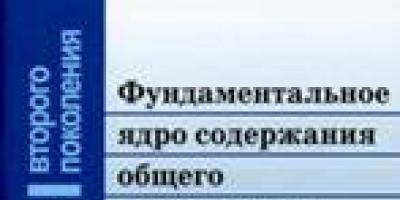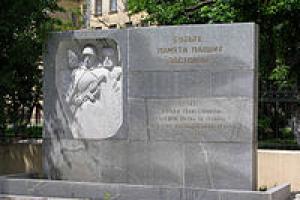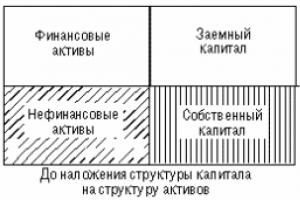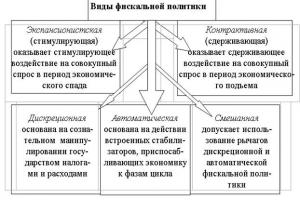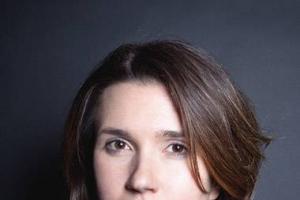| (I. Kant Russian State University) | |
|---|---|
| Year of foundation | |
| Rector | Klemeshev A.P. |
| Location | Kaliningrad |
| Legal address | 236041, Russia, Kaliningrad, st. A. Nevsky, 14a |
| Website | http://kantiana.ru |
Russian State University named after Immanuel Kant (RSU named after I. Kant ) - a leading university in the Kaliningrad region.
Previously called Kaliningrad State University (KSU ).
History of University
Russian State University named after. I. Kant was created as the Kaliningrad State Pedagogical Institute in the city. At the Kaliningrad State Pedagogical Institute there were three faculties: history, literature and physics and mathematics. Later, the historical and literary faculties were merged into the historical and philological faculty, and the faculty of pedagogy and methodology was opened primary education and Faculty of Natural Sciences. The first students who graduated from the university with honors were embossed on the wall of the lobby in gold letters. Among the graduates was S. V. Daniel-Beck, the future Chief Editor Kaliningrad book publishing house.
The university actively participates in such international research programs and projects as Tacis, Intas, Interreg, etc.
Faculties
- Faculty of Service
- Faculty of Bioecology
- Faculty of Geography and Geoecology
- History department
- Faculty of Mathematics
- Faculty of Psychology and Social Work
- Faculty of Linguistics and Intercultural Communication
- Faculty of Philology and Journalism
- Physics and Technology Faculty
- Faculty physical culture and sports
- Faculty of Medicine
- Faculty of Economics
- Faculty of Law
Rectors
- - Prikladov Nikolay Vasilievich
- - Borisov Anatoly Alexandrovich
- - Medvedev Nikolay Andreevich
- - Fedorov Gennady Mikhailovich
- - present Klemeshev Andrey Pavlovich
University buildings
The faculties of Bioecology and Geography and Geoecology are located in the former Albertina building
Despite the fact that the Kant Russian State University is considered the successor of the Albertina, in fact it uses only one building that belonged to the famous University of Königsberg - the building in which the faculties of bioecology and geography and geoecology are located on the street. University. The building, destroyed during hostilities, was restored in 1964 in a heavily rebuilt form (in fact, all decorative elements were removed), and until 1967, when it was transferred to the Kaliningrad State University, it housed school No. 32.
The administrative building and the building of the Faculty of Physics and Mathematics are located in a building specially built for the university, and the building of the history and pedagogical faculties is located in the building of the former German school of Kraus and Hippel.
Currently, in accordance with the Program for the Reconstruction of the Center of Kaliningrad, it is planned to recreate the building of the University of Königsberg, located on the skeleton of Kneiphof (the so-called “old university”).
Museum
Notes
Links
- Official website of the Russian State University named after. Immanuel Kant
Wikimedia Foundation. 2010.
See what "Kaliningrad State University" is in other dictionaries:
Kaliningrad State University- Kaliningrad regional, st. A. Nevsky, 14. Psychology, pedagogy and psychology, pedagogy and methodology primary education. (Bim Bad B.M. Pedagogical Encyclopedic Dictionary. M., 2002. P. 472) See also Universities... ... Pedagogical terminological dictionary
- (KSTU) ... Wikipedia
- (I. Kant Russian State University) Year of foundation 1947 (as an institute) 1966 (university status) Rector A.P. Klemeshev ... Wikipedia
Russian State University named after Immanuel Kant (RSU named after Immanuel Kant) Year of foundation 1947 Rector A.P. Klemeshev ... Wikipedia
Russian State University named after Immanuel Kant (RSU named after Immanuel Kant) Year of foundation 1947 Rector A.P. Klemeshev ... Wikipedia
RUSSIAN STATE UNIVERSITY NAMED AFTER IMMANUEL KANT (Kaliningrad), founded in 1947 as the Kaliningrad State Pedagogical Institute, in 1966 reorganized into the Kaliningrad State University. Since 2005 the present name.… … encyclopedic Dictionary
| Baltic federal university named after Immanuel Kant (IKBFU named after Immanuel Kant) |
|
|---|---|
 Building No. 3 of the IKBFU named after Immanuel Kant on Universitetskaya Street, building 2 in Kaliningrad. |
|
| International name | Immanuel Kant Baltic Federal University |
| Former names | Kaliningrad State Pedagogical Institute (1947-1966), Kaliningrad State University (1966-2005), Russian State University named after Immanuel Kant (2005-2010). |
| Year of foundation | |
| Type | federal university (since December 30, 2010) |
| Acting Rector | Fedorov Alexander Alexandrovich |
| Students | 16,000 people. |
| Postgraduate studies | 610 people. |
| Location | Russia, Kaliningrad. |
| Legal address | 236041, Russia, Kaliningrad, st. Alexandra Nevsky, 14 |
| Website | kantiana.ru |
| Media files on Wikimedia Commons | |
"Immanuel Kant Baltic Federal University" (Immanuel Kant IKBFU, "Kantiana") - federal state autonomous educational institution of higher education, founded in 1947 in the city of Kaliningrad, Kaliningrad region of the Russian Federation, which received the status of a federal university on December 30, 2010.
It is the oldest university in the Kaliningrad region Russian Federation. Its history began almost simultaneously with the history of the new Russian region, formed on the land of the former East Prussia after its conquest by the Red Army during the Königsberg offensive operation (April 6 - 9, 1945) during the Great Patriotic War.
Currently, the Immanuel Kant IKBFU is a leading university in the Kaliningrad region, one of ten federal universities in Russia and one of the centers higher education and science in the Northwestern Federal District of the Russian Federation.
After the Great Patriotic War
As a result, in 1947 it was created Kaliningrad State Pedagogical Institute (KSPI). In July 1948, the institute began work. Initially, the institute had three faculties: history, literature and physics and mathematics. Later, the historical and literary faculties were combined into the historical and philological faculty, and the faculty of pedagogy and methods of primary education and the faculty of natural sciences were opened. The names of the first students to graduate with honors were embossed in gold letters on the wall of the building's lobby. Among the graduates was S.V. Daniel-Beck, the future editor-in-chief of the Kaliningrad book publishing house.
The state of the institute at the beginning of its development, which occurred in the post-war period, is described as follows: “According to the staffing schedule approved for 1948/1949, 4 associate professors, 3 senior teachers, an assistant and 4 heads of departments were supposed to work at KSPI. But even with this number of employees, the Ministry of Education of the RSFSR could not provide again open institute. For example, not a single teacher was sent to the Faculty of History and Philology.”
Rectors
- - - Doctor of Biological Sciences N. V. Prikladov
- - - Doctor of Geographical Sciences A. A. Borisov
- - - Doctor of Economics N. A. Medvedev
- - - Doctor of Geographical Sciences G. M. Fedorov
- - - Doctor of Pol.Sc. A. P. Klemeshev
- with - acting rector A. A. Fedorov
Faculties and institutes
Building No. 4 of the IKBFU named after Immanuel Kant on Chernyshevsky Street, building 56 “A” in Kaliningrad.
Currently, the Immanuel Kant Baltic Federal University has 11 faculties and institutes as faculties, High school pedagogy, European Business School of Immanuel Kant IKBFU and 2 colleges.
- Kaliningrad State College of Urban Planning
- Technical College of Immanuel Kant IKBFU
Branches
International activity
Currently, there are 102 cooperation agreements between Immanuel Kant IKBFU and various foreign higher education institutions. educational institutions Poland, Germany, Lithuania, Latvia, Belarus, Finland, Denmark, Austria, France, Sweden, Italy, USA, Estonia. The Baltic Educational Forum is held annually at the university, where issues of modernization of education are discussed taking into account international experience.
In 2011-2016 international relations were led by candidate of political sciences Igor Igorevich Zhukovsky, who on September 1, 2016 was appointed Head of the representative office in the Republic of Poland of the Federal Agency for CIS Affairs, Compatriots Living Abroad and International Humanitarian Cooperation.
Partner universities
Currently, there are 102 cooperation agreements between Immanuel Kant IKBFU and various foreign higher education institutions:
- Austria
- Belarus
- Belarusian State University of Physical Culture, Minsk;
- Belarusian State Pedagogical University named after Maxim Tank;
- Grodno State University named after Yanka Kupala;
- Gomel State University named after Francis Skaryna;
- Belarusian Trade and Economic University of Consumer Cooperation;
- Baranovichi State University;
- Grodno State Medical University.
- Great Britain
- University of the West of England, Bristol;
- University of Cambridge ESOL Examinations;
- Cambridge University (Cambridge Exams).
- Germany
- University named after Ludwig Maximilian, Munich;
- University of Siegen;
- University of Bremen;
- University named after Friedrich Schiller, Jena;
- University of Lubeck;
- Gottfried Leibniz Institute for Regional Studies, Leipzig.
- Greece
- Athens University of Economics and Business;
- Alexandrian Technical University Thessaloniki.
- Denmark
- Higher Pedagogical College, Ikast;
- Aarhus University.
- Italy
- Lithuania
- Poland
- Gdańsk Technical University;
- Bialystok Polytechnic Institute;
- University of Warmia and Mazury, Olsztyn;
- University of Gdansk;
- University of Lodz;
- Gdańsk Medical Academy;
- Wroclaw University of Technology;
- University of Wroclaw;
- University of Bialystok;
- Academy humanities, Pułtusk..
- USA
- Oklahoma State University;
- Fairfield University;
- State University of New York;
- Middle Tennessee State University;
- University and University College of Georgia.
- Finland
- University of Turku;
- University of Applied Sciences (JAMK) Jyvaskylä.
- France
- University Pierre Mendès France, Grenoble 2;
- University of Savoy;
- International School of Trade and Development 3A, Lyon;
- European Institute for Teaching Public Relations - IEERP, Paris;
- National Polytechnic Institute of Toulouse;
- Higher public school in electrical engineering, electronics, computer science, hydraulics and telecommunications.
- Sweden
- University of Malmo;
- Lund University;
- Gotland University;
- Uppsala University.
- Estonia
- Estonian University of Life Sciences, Tartu.
- Israel
- Tel Aviv University.
- Croatia
- Zadar University.
- Armenia
- Russian-Armenian (Slavic) University, Yerevan;
- University of Languages and Social Sciences named after V. Bryusov
and many other universities.
Associations
IKBFU named after Immanuel Kant is a member of the following international associations and organizations:
- “European University Association” (since 1993), coordinator – University of Vienna (Austria);
- “Baltic Sea Region University Network” (since 2000), coordinator – University of Turku (Finland);
- “Magna Charta Universitatum”, coordinator – University of Bologna (Italy);
- “Baltic University Programme”, (since 2006), coordinator – Uppsala University (Sweden);
- UN Academic Impact Program (since 2010);
Scientific activity
The Immanuel Kant IKBFU conducts fundamental and applied Scientific research in 65 departments and 40 scientific centers and laboratories (including the Baltic University Program Center, the Russian Language Center, the Marine Training and Research Station, the Center for New information technologies, Center of Russian Culture in the South-Eastern Baltic, etc.). The university has developed scientific schools in Kantian studies, studies of Russian philosophy, studies of linguistic modality, territorial and landscape planning, comprehensive studies of the Baltic region, studies of the World Ocean, ionospheric physics, quadrupole and nuclear magnetic resonance, geomagnetic processes and radio wave propagation.
The university actively participates in such international research programs and projects as "Tacis" and "Interreg".
IKBFU in ratings
University buildings
Building No. 1 of the IKBFU named after Immanuel Kant on A. Nevsky Street, building 14 in Kaliningrad.
Immanuel Kant IKBFU is not a successor to the University of Königsberg (Albertina). IKBFU uses only one building that belonged to the famous University of Königsberg - the building in which the Institute of Living Systems is located on Universitetskaya Street, building 2. The building, destroyed during hostilities, was restored in 1964 in a heavily rebuilt form (in fact, all decorative elements were removed) , and until 1967, when it was transferred to Kaliningrad State University, it housed high school No. 32 (later moved to new buildings of schools No. 31, 32, 33).
The administrative building, the swimming pool and the buildings of the faculties of applied mathematics and information technology and physics and technology, as well as the faculty of service, are located on a campus specially built for the university, the building of the faculty of physical education and sports, history, economics and psychology - in the building of the former German technical school Kraus and Hippel, the adjacent building houses the faculties of Slavic philology and journalism, as well as linguistics and intercultural communication.
Currently, in accordance with the Program for the Reconstruction of the Center of Kaliningrad, it is planned to recreate the building of the University of Königsberg (the so-called “old university”), located on the island part of the city of Königsberg called Kneiphof.
Representative offices
Museum
In 1977 in Kaliningrad state university The office-museum of Immanuel Kant was created. In accordance with the “Regulations on the Cabinet-Museum of Immanuel Kant,” its goals and objectives were defined: the study and promotion of the philosophical heritage of Immanuel Kant and other classics of philosophy of the 18th century; search and research work (study and acquisition of new exhibits, rare books by I. Kant and about Kant, as well as other thinkers - contemporaries of I. Kant); holding Kant readings.
In 1994, it was decided to expand the structure of the museum by including exhibits from the previous office-museum in the exhibitions of the new museum. On June 1, 1995, the University Museum began its activities. The Museum's exhibition consists of three sections:
- history of Albertina (University of Königsberg 1544-1945);
- history of Kaliningrad State pedagogical institute(1947-1966);
- history of the modern university.
The “Passing Score” column indicates the average passing score for one exam (the minimum total passing score divided by the number of exams).
What is it and why is it important?
Admission to a university is based on the results of the Unified State Exam (for each exam you can score a maximum of 100 points). When enrolling, individual achievements are also taken into account, such as the final school essay(gives a maximum of 10 points), an excellent student certificate (6 points) and a GTO badge (4 points). In addition, some universities are allowed to take an additional exam in a core subject for the chosen specialty. Some specialties also require passing a professional or creative exam. You can also score a maximum of 100 points for each additional exam.
Passing score for any specialty at a particular university - this is the minimum total score with which the applicant was admitted during the last admissions campaign.
In fact, we know what scores you could get in last year. But, unfortunately, no one knows with what score you will be able to enter this or next year. This will depend on how many applicants and with what scores will apply for this specialty, as well as on how much will be allocated budget places. Nevertheless, knowing the passing scores allows you to assess your chances of admission with a high degree of probability, so you should focus on them, this is important.






